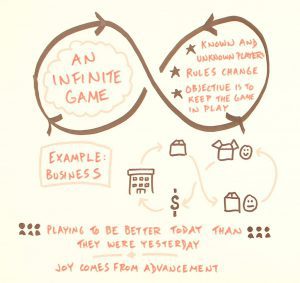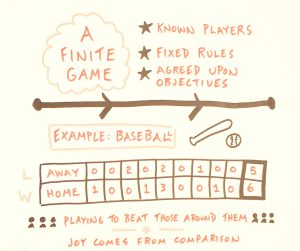My grandfather’s name was Gale. He was an interesting guy, one of those people who was wise beyond his years because he had lived through some hard times, observed life, and learned from his experiences. That wisdom inspired some of his beliefs and led to significant changes in our family’s lives for generations.
My mother was born in the middle of the Great Depression and was old enough to remember World War II vividly. She graduated from high school in 1953. It was a time in rural farming communities that it was customary for a young lady to get married, often to a farmer, and begin her own family.
But Gale was not your typical Iowa farmer in the 50’s. He was known for being an independent thinker. As such, he insisted that his two daughters go to college and get an education so that they would be able to stand independently on their own. A lot of people made fun of Gale for sending his girls to school, but this decision had an impact that has caused ripples for generations.
You see, when I was growing up, the thought of not going to college never occurred to me. It was a foregone conclusion. It wasn’t “if” I would attend…it was where and what for.
In my immediate family, among the five siblings, there are five bachelor’s degrees, four master’s degrees, and two doctoral degrees. Now that educational legacy is passing through our children, with the oldest of our grandchildren working his way through his residency for medical school.
As I think back about who Gale was and how he influenced our family, it made me think of a presentation by Simon Sinek, a noted author, marketing consultant and speaker, on game theory and the idea of the infinite game.

In game theory, there are essentially two types of games—finite and infinite. Finite games have defined rules and a defined end that has clear winners and losers. Checkers, chess, baseball are examples of finite games.
Infinite games, on the other hand, have both defined and undefined rules with no clear ending or timeline. The Cold War or the invasion of Afghanistan by Russia might be good examples. In an infinite game, there is no winner. The game ends when a participant lacks either the resources or the will to go on.
At The Planning Center, our vision as a firm centers on having long-term relationships with families that, whenever possible, last greater than 40 years. The more I think about financial planning, the more I wonder if there might not be a better way to shift our thinking about how we live our lives using the idea of the infinite game.
When clients first walk into The Planning Center, they often have lot of questions. Will I be okay? Will I be able to retire? Did I save enough? Will we have to modify our lifestyle in retirement? Do we have enough in savings so we don’t become a burden on anybody?
These are all very important questions to be concerned about and answer. We can view these questions through the lens of game theory. These clients have finite resources and want to make sure they will be able to achieve and maintain some form of financial independence over their lifetime. If you step back and look at it from that that perspective—either they win or they lose.
They win if they are able to maintain their independence. They lose if they run out of money and cannot maintain their independence. This is not necessarily an incorrect perspective; it is a very practical framework. The typical perspective of financial planning looks very much like the finite game.
Through the lens of the infinite game, financial planning questions begin to change. The questions begin to sound like: How do we use the assets of the family to make a contribution beyond ourselves? What are the skills that each of us need to develop? How do we communicate about the role of our wealth? How do we manage conflict or make decisions as a family?
Notice that there is a shift in the conversation from the quantitative aspects of money to the qualitative. Now we are beginning to look at not just the impact of money to our own lives, but to contributing beyond just ourselves. With this perspective of the infinite game, financial planning becomes a matter of stewardship of all the family assets—the human, intellectual, and social capital. The financial capital is just the medium used to build and grow these other assets.
As I look at my grandfather Gale’s life, I can see the values that were transferred to our family: valuing education, a strong work ethic, resiliency, etc. As I look at my children, I think about what assets (non-financial) and values we will transfer to them. As they age, I wonder what they will reflect upon and hope to transfer to their children. I invite you to have the discussion with one of the planners here at The Planning Center about the qualitative aspects of your money. We would love to have that conversation with you.
Finite and Infinite Game sketches are based on the original ideas of Simon Sinek from the website: http://www.verbaltovisual.com/the-game-visual-thinkers-play/
Eric Kies, CFP®, is a Partner/Sr. Financial Planner in the Quad Cities office of The Planning Center, a fee-only financial planning and wealth management firm.
Email him at: eric@theplanningcenter.com.





